I liked Squid Game except for one thing: it reminded me of clicker training.
I’m an animal trainer, you see. I use positive reinforcement with horses. And the more I watched, the more comparisons I could draw between the show and the causes – and effects – of a careless clicker session.
So if you’ve seen Squid Game and you enjoy using positive reinforcement with your horse, this article is for you. Be warned: there are major spoilers and some dense training science. It’s a deep dive and longer read than most posts on the blog.
If you want to read but you haven’t watched Squid Game yet, go ahead. Watch all nine episodes, cry, scream, and come back.
Ready to play?
Squid Game: Voluntary, but Actually Not
Squid Game is about people who participate in a set of games to earn money. Their participation is voluntary. Hmmm…subjects who voluntarily offer behaviors for a chance at a reward. Sounds familiar, doesn’t it?
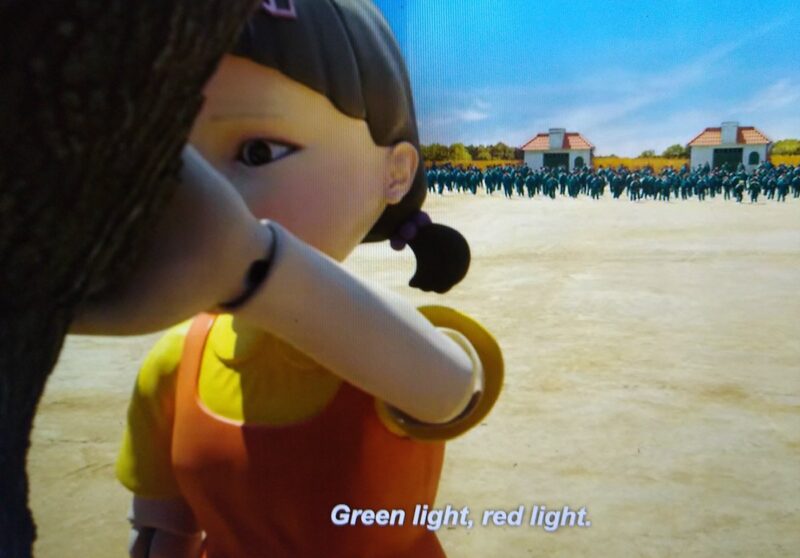
But that’s not all there is. I left out a few small details.
One of Squid Game’s driving themes is that the choice given to the players – to play a game they will probably lose, with terrible consequences – isn’t really voluntary at all. The show does a great job of illustrating how a supposed choice isn’t truly a choice. The devil really is in those details. The players play, and die, because of underlying but inescapable coercion.
And positive reinforcement can be the same way.
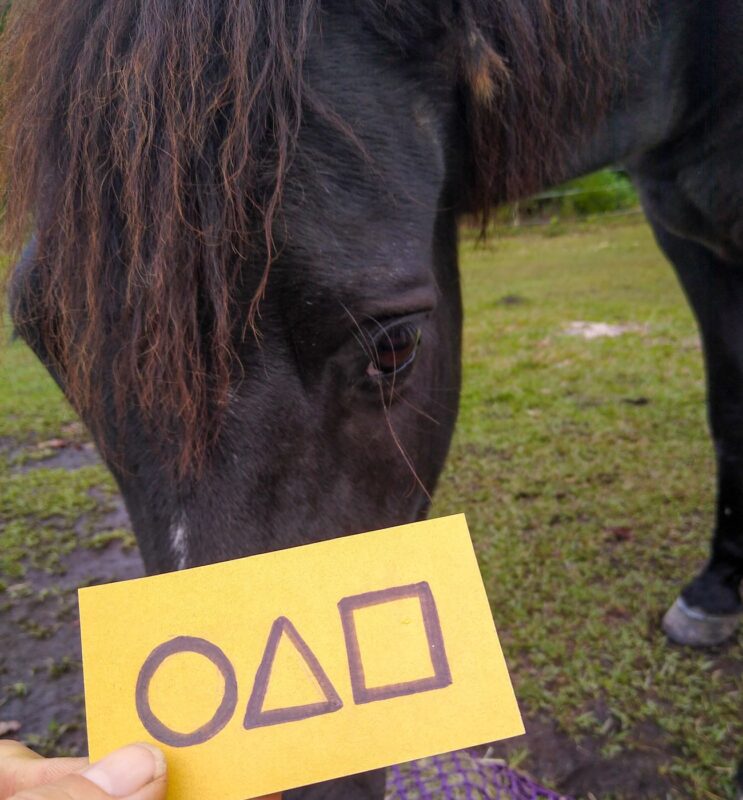
Let’s stop here so I can say that I strongly advocate for positive reinforcement. This isn’t an anti-R+ article. I’ll repeat this a few more times in this piece so you can’t forget: this isn’t a conversation about how clicker training doesn’t work or isn’t humane. It DOES work and when done right it is incredibly kind. R+ is miles away from punishment-based training structures.
What I want to talk about are the ways that pressure and coercion can sneak into our clicker sessions, Squid Game style – the signs that your horse is playing Squid Game during training, and how to fix it.
Clicker Training: Voluntary, but…Actually Not?
One of the fundamentals of clicker training is that it’s voluntary for your horse. It’s learning through positive reinforcement. You reward the behaviors you want to see more of, and your horse happily works with you because they want to earn more of those rewards.
It’s an amazingly effective way to train. When done right, it builds incredible bonds between you and your horse and is much more humane than just punishing them for things you don’t like. It’s also much less intrusive than negative reinforcement, the familiar add-pressure-and-release-to-reward strategy of “natural horsemanship” and many others.
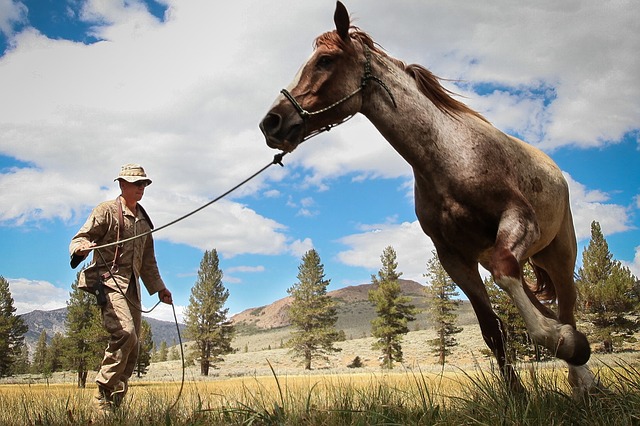
But here’s the thing: just like the antecedents and consequences in Squid Game create an undisputable element of coercion, pressure and force can exist in clicker training sessions. It can sneak in, almost in the background.
In Squid Game, the players get into the vans on their own. They’re told in the beginning that they can leave. And after Red Light Green Light, they see exactly how the games work in bloody detail.
At that point, many do choose to leave. Like a horse walking away from a training session, the players make it clear that the promised reward isn’t worth their participation.
But then they come back. They walk back into a situation that is most definitely inhumane.
Why do the players return to the game? And how may some horses find themselves in a similar choice-but-not-really situation? What can Squid Game teach us about how not to use positive reinforcement?
Here are three Squid Game Training Problems and how avoiding them keeps your horse’s welfare high during clicker training.
Squid Game Training Problem #1: The Reinforcement is Too Valuable
One of Squid Game’s recurring visuals is that oversized clear piggy bank suspended above the central room where the players sleep. There’s an immense amount of money inside. The chance of winning and taking the payout motivates them to participate – at least at first.
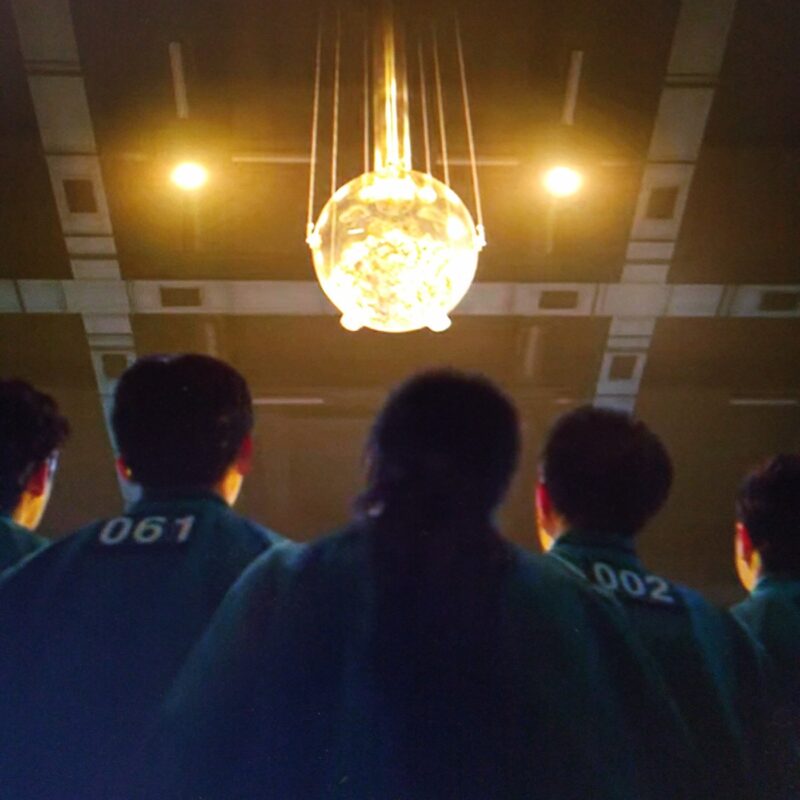
After realizing the stakes, would the players have stayed in the game if there hadn’t been as much money in that piggy bank? After walking away in Episode 2, would they all have come back if the promised reward was a lot less?
Probably not – especially if the reward wasn’t enough to pay off their debts (more on that later).
Squid Game’s giant piggy bank is a training reward – a reinforcer – that is excessively high in value. It’s so valuable to the players that they’ll put themselves in horrifically dangerous, frightening situations in order to get it.
For many horses, high value reinforcers are the equine equivalent of glowing, cash-filled ceiling pig. It may seem counterintuitive, but using an amazingly tasty food reward isn’t often the best way to train. It risks putting you in Giant Piggy Bank territory. Your horse wants that sugary treat or apple chunk so much that they’ll do anything to get it.
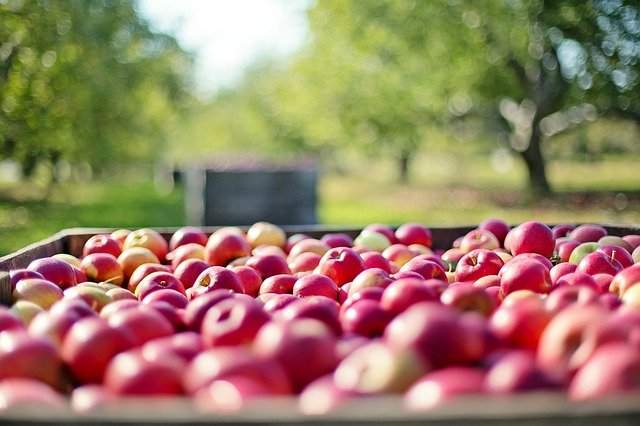
There are behavioral consequences of excessive motivation or desire for the reward. When your horse fixates on the treat itself, they’re not necessarily paying attention to the shaping process. They’re like the players watching the glowing piggy bank during lights-out. Your horse is also more likely to participate in sessions that put them over their fear threshold or cause physical pain, simply because the reward is so desirable.
The Squid Game players also demonstrate another common result of too-valuable reinforcers: frustration and aggression. It’s made worse by increased fear and anxiety about the money as the show progresses. As the stakes get higher and the amount of money in the piggy bank grows, the players become increasingly short-fused and become willing to harm the people around them.
In training sessions, this can show up as mugging for treats (though in some cases mugging is caused by the way treats are delivered). Other clear signs are angry body language and facial expressions during the session, impatience between cues, and rapid “shotgunning” of behaviors as the horse tries to quickly offer whatever behavior will earn the click and treat. Eventually, it can even progress to aggression toward the trainer.
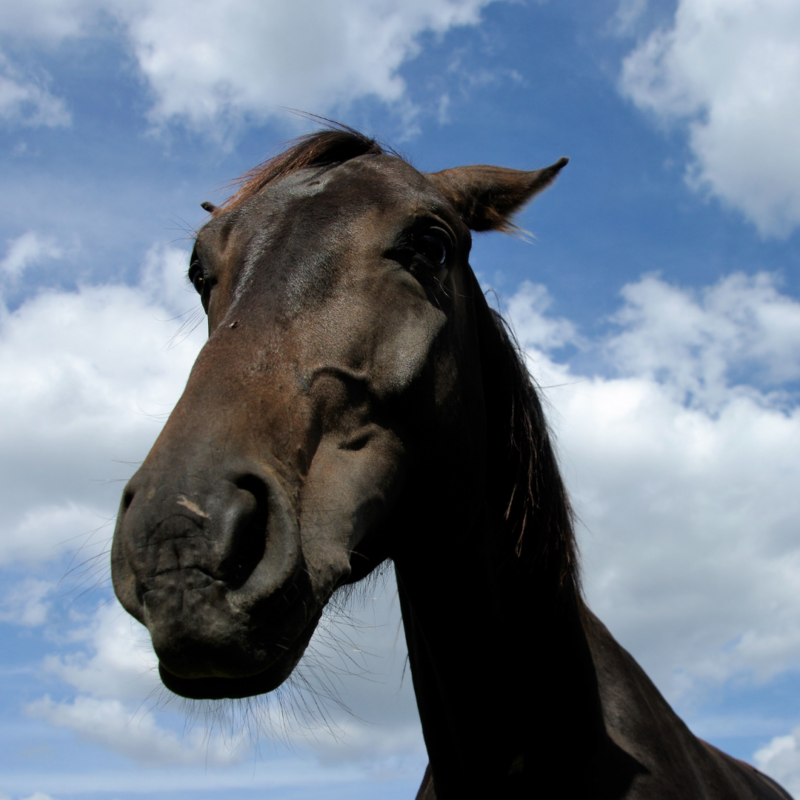
Sweet, highly palatable treats such as cookies and fruit are the biggest culprits. If you’re seeing pushiness, food aggression, or frustration and anger during training sessions, your horse might be experiencing the equine version of Giant Piggy Bank.
This is something you should address right away, because the behavior will get worse without intervention. It also means the horse probably isn’t enjoying the training as much as they could be, because of the increased irritation and impatience to score a treat. So what can you do to help?
Fixing Squid Game Problem #1: Empty that Piggy Bank
One of the best ways to ease excessive eagerness around food during your clicker training sessions to use lower value rewards. The type of reinforcer you use – what it is and how much you give – is a major factor in successful positive reinforcement. Most horses work best with food items that are tasty, but not too much.
This means dropping the store-bought horse treats, apples, and peppermints from your training pouch, at least temporarily. Instead, try less sweet or forage-based rewards. As an alternative, hay pellets make a great lower-value reinforcer. They’re easy to handle, simple to feed, and extend chewing time.
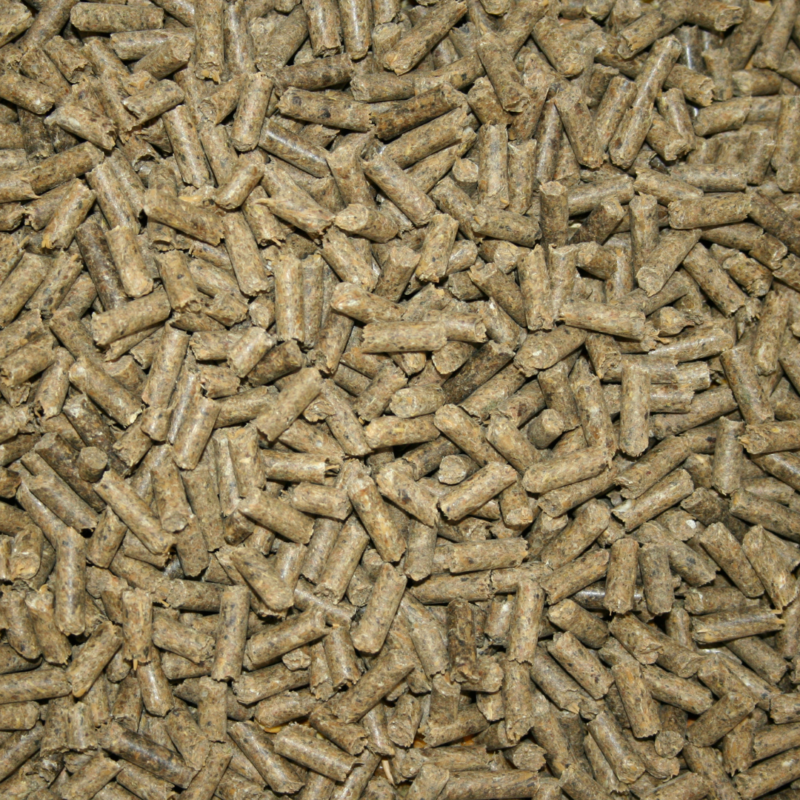
You can also use a larger amount of hay pellets or other forage-based rewards in training, which lets you reward more often and in greater quantity. A higher rate and volume of reinforcement work together to reduce frustration. Switching away from ultra-palatable reinforcers is the equivalent of emptying out that glowing piggy bank and putting the reward scheme on fair ground.
Other appealing but not insanity-inducing treats include cucumber and celery chunks, which are crunchy and enjoyable but not as sweet as apples and carrots. For another dry option, try roasted in-shell peanuts.
When you’ve made sure that the type of reward doesn’t accidentally create coercion, it’s time to check for the next Squid Game Training Problem.
Squid Game Problem #2: There’s a Fundamental, Unmet Need
What do all the participants in Squid Game have in common?
They’re all desperate for money – a vital resource for humans in the modern world.
From the first moments of the show, we see that each of the characters have enormous debt and many aren’t able to acquire basic necessities. They can’t enjoy a good quality of life because of their unmet needs and related anxieties. It’s this insistent, ever-present need for money that motivates the players to join the game. And, even after the first episode ends in hundreds of deaths, that same desperation for money drives them back to the playing arena.
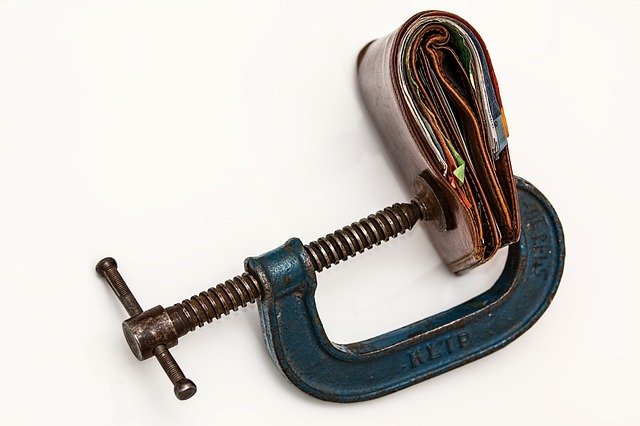
This self-destructive attempt to get out of debt comes from resource anxiety as a result of long-term scarcity, and can happen to horses too. How do unmet needs contribute to Squid Game clicker training? It all comes down to equine biology.
Remember the first Squid Game Training Problem: the excessively valuable reward coerces the players into participating. But if the people weren’t in debt and unable to meet their basic needs, it’s likely that almost no amount of money could lure them into the games.
Horses don’t stress about money and they don’t understand debt. But they have a very good understanding of their basic survival resources – think food, friends, water, and shelter. Of these, food is the resource that causes the most trouble for training. An alarming number of horses have a background level of food anxiety, and this can create Squid Game-level tension and accidental coercion in clicker sessions.
Horses are adapted to have almost constant access to forage. It doesn’t have to be rich, lush grass (that’s a very bad idea for many horses). But for good physical and mental health, they need to have small amounts of forage moving through their digestive tract almost all the time.
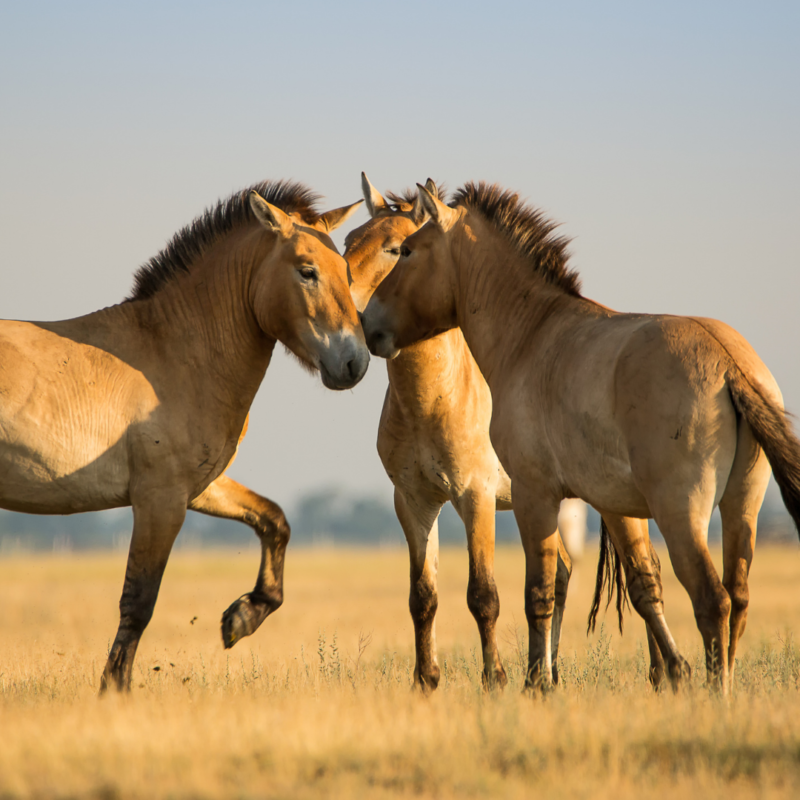
In addition to the physical consequences of fasting, horses are also extremely aware of how much forage is available and how heavy the competition for that forage is. This means that feeding horses “meals” of grain or hay, with no chance for forage in between, sets a horse up for resource anxiety. It’s the same as the people in Squid Game: needing money, not having any, and often having no way to get it. It’s a deeply disempowering and stress-producing state for horses just as in people.
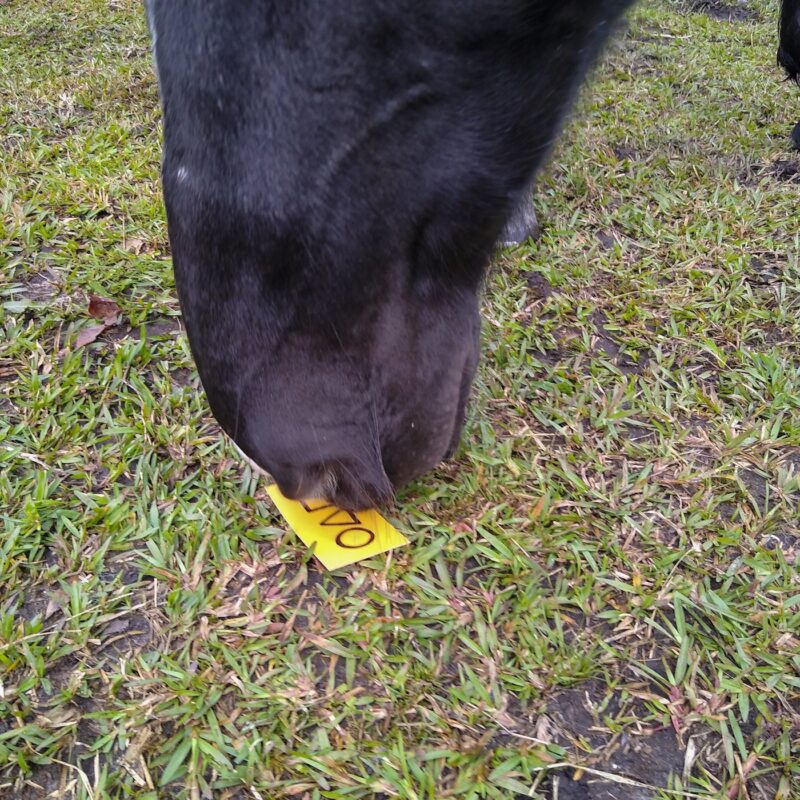
There can be enough calories in the diet without 24/7 forage. But to the horse, having no access to food means scarcity. This leads to above-normal levels of food motivation and preoccupation with food.
Food anxiety sets your horse up as a Squid Game player because it makes them excessively invested in food and affects their judgement. To you, clicker training is a fun game that helps your horse learn important skills. For the food-anxious horse, it’s a rare chance to earn a scarce resource. They’re more likely to participate in training and offer behaviors that they’re uncomfortable with. The horse’s stressed state starts every session on a bad emotional footing and can contribute to frustration.
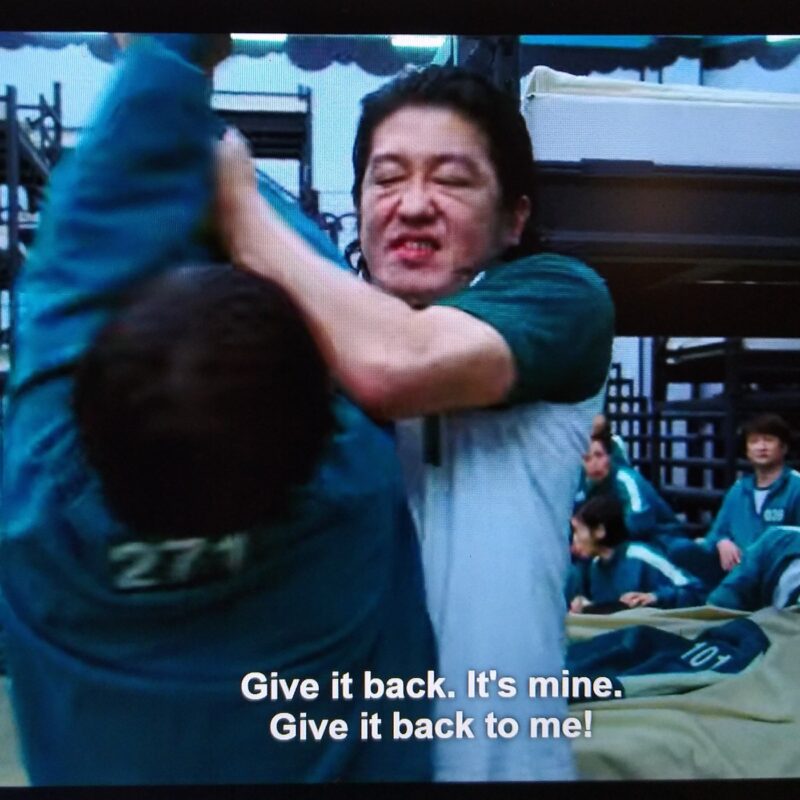
If you have a horse with food anxiety, it’s a good idea to make some changes in the routine to simply to help them feel better. And changes are definitely a must to alleviate some of their desperation around feeding before you start clicker training.
After all, it’s our job as trainers not to set the horse up so that they trot right over their own comfort boundaries. Using food rewards with a food anxious horse makes it too easy to accidentally create coercion, rather than truly voluntary participation.
What’s the best way to avoid this problem? Get rid of the debt.
Fixing Squid Game Problem 2: Pay the Debt by Meeting Underlying Needs
Most positive reinforcement training in horses uses food rewards. There’s nothing wrong with this as long as we’re careful to avoid the Piggy Bank Problem and meet our horses’ need for food security.
To solve Problem #2, your horse should have access to forage before and after training. If they absolutely cannot have hay or other forage all the time, at least provide it for a few hours prior to your training session. Add a hay net and let the horse have a good, long graze from it before you bring them out for training.
The best solution in the long run is to have 24/7 forage available to the horse, slowed down with a hay net or other feeder if necessary, so that your horse doesn’t experience scarcity. This also provides a sense of agency. It gives your horse the option to seek and receive food at all times, not just when a person shows up with a bucket. Horses with strong food anxiety – like those with a history of starvation or excessive competition over food – may only be comfortable in clicker training if in a permanent scarcity-free routine.
Have forage available during the training if possible. A pile of free hay or small hay pillow nearby gives your horse an alternative. It helps signal that, even during training, there’s no resource scarcity. They’re not “in debt” without access to food. If your horse feels uncomfortable or doesn’t want to participate, they’ll have the option to disengage and eat. This is a positive reinforcement structure that lets the horse participate on their own terms, without accidental coercion.
With food anxiety and reinforcer value addressed, there’s one more problem that can sneak into clicker sessions.
Squid Game Problem #3: The Stakes are Too High
Even people who haven’t watched Squid Game (yet) probably know the basic idea. You play kids’ games. If you win, you get tons of money. If you don’t, you die.
Nobody dies in clicker training! Remember, this article is about how to avoid training pitfalls, not a dunk on reward-based training. Clicker training is awesome, remember? It’s important to note, though, how it’s not how we feel about clicker sessions that really matters. It’s how your horse feels.
All the Squid Game players know deep down that, no matter how much they want to win, they’re not likely to succeed.
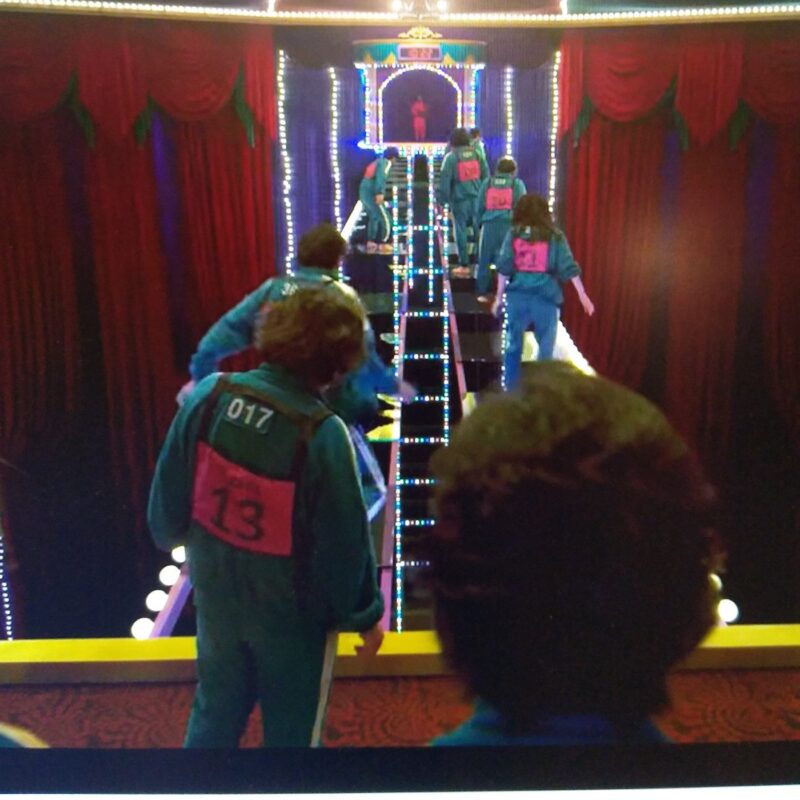
They know the games are sometimes unfair or even impossible, and the consequences of failing are immense. It’s hard to say whether the ultra-high stakes and slim chances help or hurt the players’ performance. But it’s clearly traumatic, and inhumane.
We wouldn’t ever want our clicker training structure to affect our horses in a similar way. But could it?
Some training session structures and consequences can elevate the stakes of the session for the horse. At best, the horse may not seem to mind, but they’re still experiencing coercion. At worst, it results in intense frustration, anxiety before and during training, overenthusiastic or keyed-up responses, and a horse who melts down when they get it “wrong.”
Do any of these sometimes happen in your clicker training sessions? If so, your horse may be experiencing Squid Game-level high stakes:
- Ending a training session (thus taking treats with you) for too many “incorrect” responses
- Ending a training session for inadequate participation or the horse leaning/walking away from you
- Approximations that are too challenging and the horse failing repeatedly to “win” any reward
- Leaving the horse in a bare stall or paddock after training so that the end of the session means loss of opportunity for any food
- Using aversives intentionally or accidentally when the horse makes a mistake or refuses, such as adding “pressure” to guide them away from a “wrong” choice and toward the one you want
- Using or threatening positive punishment (big voice, body language, and swatting/striking the horse) either for incorrect responses or in response to aggression from the horse
This is Squid Game Problem #3: excessively high stakes for mistakes or failure. Your horse might earn a reward and feel good when they win. But if they mess up, bad things happen.
Remember the episode with dalgona, the sugar honeycomb candy? It’s a classic example of what happens in training when the consequences for failing are too high. In a no-consequence situation, most of the players could easily pick the shapes out of the candy. I mean, it is a kids’ pastime. But with the high stakes of the game, stress rises. Many of the players can’t focus and begin to show poor judgement with their dalgona. Their coordination and dexterity suffers. Within moments, the candy begins to crack.
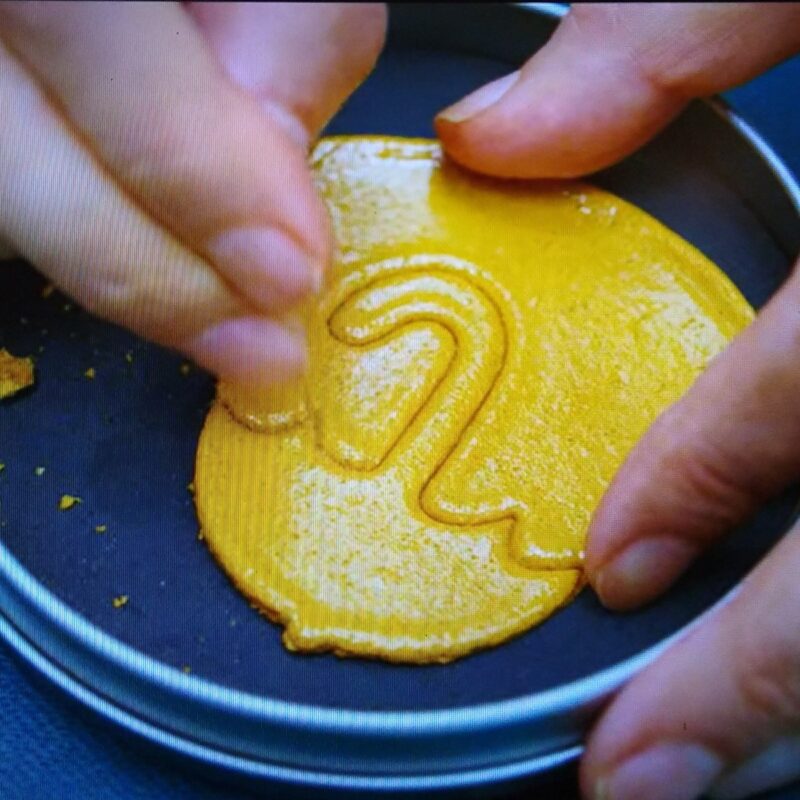
When your horse is preoccupied about the consequences of failure or mistakes in a training session, it hinders their learning. Like the other two Squid Game Problems, it can cause them to participate in spite of discomfort or fear. This stress-on-stress can create a snowball effect called “trigger stacking,” where stressful stimuli build on each other and can eventually result in a blowup.
Horses who feel they’re in high-stakes sessions can also be overenthusiastic, as they thoughtlessly attempt behaviors in order to “win” or keep the training session from ending. Some horses become unable to tolerate the end of a session or any withholding of treats (when a behavior isn’t up to criteria or you’re attempting to build duration) and can have a strongly negative response. Acting out physically or trying to block or prevent you from leaving are common symptoms.
The worst element is that it’s self-perpetuating. In a Squid Game training structure, a mistake creates an undesirable outcome. The resulting stress and frustration make it more likely that they’ll repeat the same mistake in the next session (whether it’s mugging you, not understanding an approximation, or anything else). They receive the unpleasant outcome again, and the cycle repeats.
If you’ve experienced a horse getting worse with each session (or if you’ve read this far and gave up on clicker training in the past for this reason), high stakes may be part of the problem.
What can we do to fix it?
Fixing Squid Game Problem #3: Lower the Stakes and Plan for Success
Pull your horse out of Squid Game training by lowering the stakes for failure, and planning your training so that the horse won’t make as many mistakes.
Every horse makes mistakes sometimes. Shaping means setting up approximations that build on previous learning, but there’s room for error in most shaping plans. And horses do sometimes choose not to participate in training. You should structure training sessions to plan for these normal outcomes in advance, so you won’t have to end your sessions on the wrong hoof.
If your horse refuses to participate in a training session by ignoring certain cues, try giving them the chance to offer a different behavior instead of ending your session in a my-way-or-the-highway move. Your horse may be signaling that they are uncomfortable physically or emotionally with that initial behavior. Ask for a known, high-probability behavior instead to give them an alternative way to succeed while you troubleshoot.
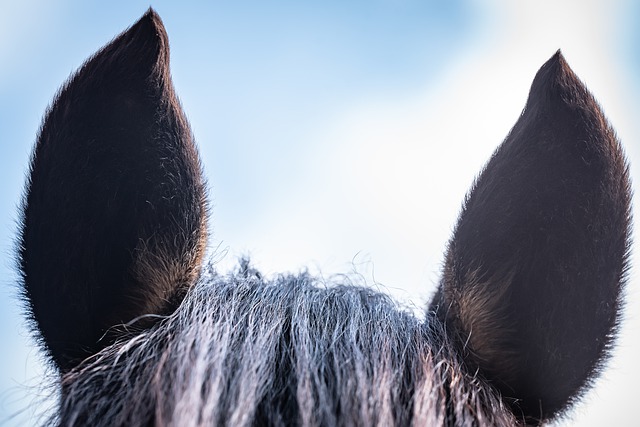
When shaping a behavior, carefully plan the steps in the training process. Each approximation, or step, in teaching a behavior should be only a little different or more challenging than the one before. Don’t allow your horse to fail – thus losing the chance for a reward – over and over. Well-planned approximations build equine confidence.
If you realize that negative reinforcement (pressure and release) or punishment have been sneaking into your training sessions, step back and evaluate. Punishment has serious impacts on learning and relationship and should be avoided. And don’t add “pressure” or other aversives in a clicker training session. It’s not positive reinforcement and adds a coercive element to your training.
Lastly, end training sessions in a predictable way and always leave your horse something to munch on when you exit the session. Turn out to pasture after training or offer a full hay net so that the end of the session doesn’t perpetuate Squid Game Problem #2, a lack of basic needs.
What If You Fix the Squid Game and Your Horse Stops Playing?
So you solve all three Squid Game Problems. You start using lower-value treats like hay pellets instead of sweet juicy apple chunks. You make sure your horse isn’t hungry and can even eat hay during a training session. And you lower the stakes by cutting out any accidental punishment.
And then your horse stops playing. They stop wanting to do clicker training.
What went wrong? Was it a bad idea to change your clicker training structure?
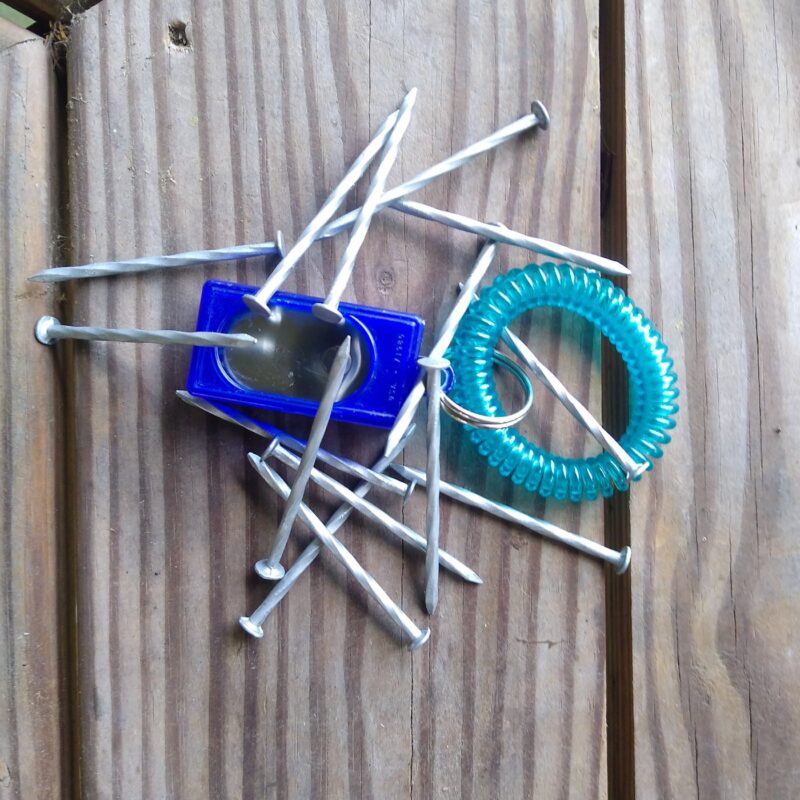
Look once more at Squid Game to see what’s going on and how to move forward.
Let’s imagine that Gi-hun, the show’s protagonist, had little or no debt and a steady job that paid enough to meet his needs (including birthday presents for his daughter and some downtime for his mom). And imagine that in the first episode’s “orientation session,” the piggie bank only offered a little money – enough for something nice, but not millions and millions. Would he still choose to play?
I doubt it. And in this situation, he and almost all the other players probably would not choose to keep playing after Red Light Green Light. Free of a coercive environment, my bet is that almost nobody would play Squid Game. Even if you eliminated the risk of dying, the games are stressful, frightening, and often painful.
If your horse doesn’t want to participate in positive reinforcement sessions after you’ve eliminated accidental or intentional coercion, it’s time to look deeper. What’s keeping your horse from enjoying clicker training?
It takes a lot of planning to set up clicker sessions that your horse wants to play. Your treat pouch and clicker are just a tiny part of what makes a great training session! You’ll also need to set up a safe, comfortable environment for most learning, have clear two-way communication, and be flexible.
Setting Up For Success
Don’t try to teach new behaviors or expect perfect results in brand-new or scary spaces. That’s like the players in Squid Game, thrust into an unfamiliar and threatening environment. Cover new material in a familiar setting, if possible.
It’s also a must to keep in mind that, when you change the environment or add distractions, it’s normal for even strong behaviors to change or slip a little. Set your horse up for success by relaxing the criteria for reward and re-shaping in every new or different situation.
For non-coercive clicker training to be engaging, the behaviors you teach must be ones that your horse is ready to learn. Don’t ask anyone to stake their life on marbles if they’ve never played marbles.
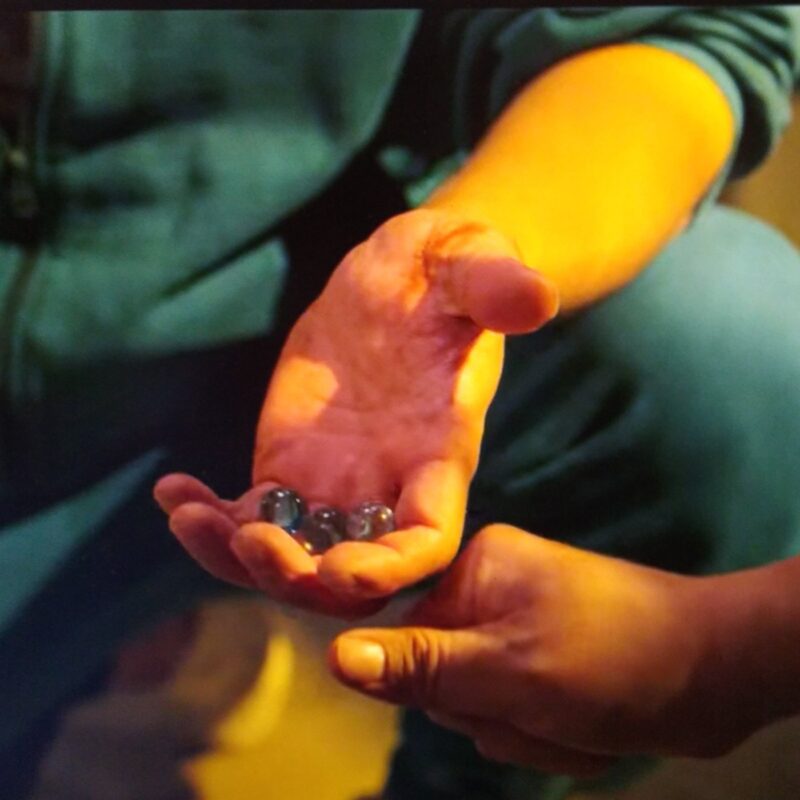
The behaviors you teach must be ones that your horse can physically do, and is emotionally comfortable attempting. And when breaking a behavior into approximations for shaping, make those steps smaller and easier than you think you need to.
Your horse should have agency and control over whether they receive reinforcement. This means it’s important to not set a training session up like the glass bridge game, where other variables affect whether the horse “wins.” This shows up in veterinary behaviors like cooperative blood draws or stethoscope training. If the horse stands quietly as trained, they should get reinforcement for their behavior whether you get the blood or hear the gut sounds successfully.
Lastly, make sure that you mark and reward behaviors thoughtfully and fairly to keep things engaging and fair for the horse. If you see that your horse is getting uncomfortable, frustrated, or fearful during a positive reinforcement situation, step back and assess what’s happening. Be observant and flexible.
Takeaway: Clicker Train, Don’t Squid Game
That’s a lot to keep in mind when planning a clicker training session. But if you keep it a priority, your horse will enthusiastically participate – no Squid Game design needed.
Thoughtful planning makes positive reinforcement incredibly enjoyable for your horse, and creates a powerful motivation to learn. Not only is it better for their wellbeing and mental health, your horse and you will get more from training when accidental coercion is out of the picture.
So let’s keep Squid Game out of the stable and enjoy happier clicker training!